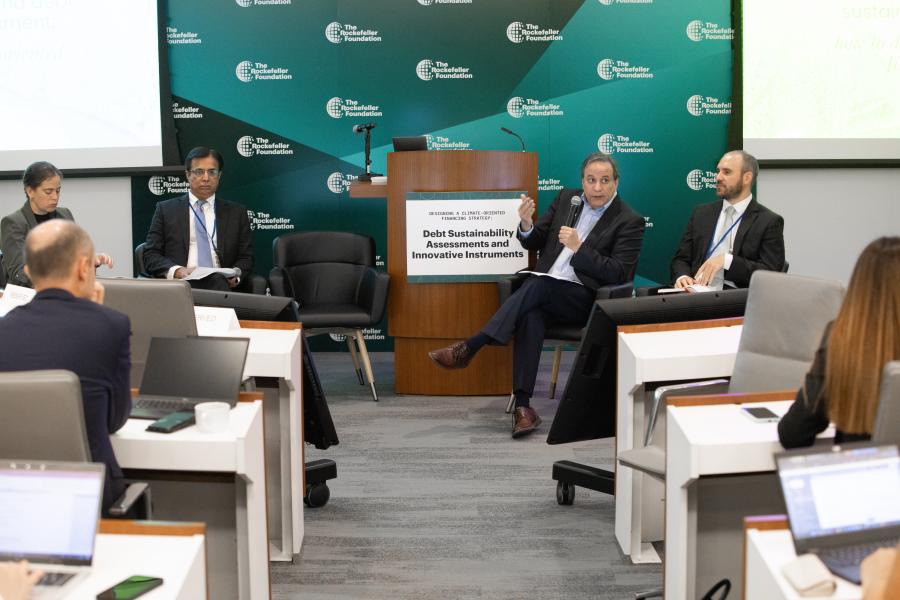Takeaways from the 2024 WB-IMF Spring Meetings
 Meeting at the Rockefeller Foundation
Meeting at the Rockefeller Foundation
Last month in Washington DC, C3A made important contributions to the climate debate, emphasizing the critical role of Finance Ministries in managing the Mid-Transition in which the fossil-fuel economy co-exists with the renewable economy generating instability and new economic and financial risks. C3A worked with a range of institutions such as the Coalition of Finance Ministers for Climate Action (CFCMA), the Brookings Institution, Finance for Development Lab and The Rockefeller Foundation to amplify its message, build new partnerships and strengthen its analytical approaches.
The essentials
The 2024 WB-IMF Spring Meetings (April 11-18) took place as the Bretton Woods Institutions marked their 80th anniversary while dealing with contemporary challenges of acute global crisis. Climate change impacts and the imperative of a global transition are at the heart of polycrisis; combining public debt vulnerabilities, geoeconomic fragmentation and disruptive technological change. This is a new context to think about climate policies exemplified, among others, by several events co-organized by C3A:
✔ 3 open-door seminars co-organized, on "the role of the Ministries of Finance in navigating the mid-transition period" with The Brookings Institution and the Coalition of Finance Ministers for Climate Action, on the fast evolving issues at the crossroads of climate and debt with Finance for Development Lab and The Rockefeller Foundation, and on the question of transition scenarios from a Ministries of Finance standpoint with the Coalition of Finance Ministers for Climate Action HP1/6 country leads;
✔ 2 closed-door workshops to scope new engagements with partner countries from our regional hubs in Latin America and the Caribbean and Central Asia;
✔ 4 meetings to discuss technical notes on green innovation, debt sustainability, nature and climate macro-modelling for Ministries of Finance with experts from WB, IMF, Academia and Ministries of Finance (stay tuned!);
✔ An active participation to the 1st Annual Forum on the Macroeconomics of Green and Resilient Transition organized by the Bezos Earth Fund and the Coalition of Finance Ministers for Climate Action, as well as the follow-up launch of the Green Macroeconomic Modelling Initiative (GMMI);
✔ Hours of great discussions on designing appropriate transition pathways towards a low carbon and nature friendly economy, as well as meetings with global leaders and experts during this worldwide gathering.
A new global context
This new global context requires revamped transition scenarios, that go beyond what previous rounds of Nationally Determined Contributions (NDC) and Long-Term Strategies (LTS) required. It involves a much deeper collaboration between Ministries of Environment and Ministries of Finance, as was raised during the Ministerial Meeting of CFCMA in a joint call with the NDC Partnership. It necessitates collaboration in articulating transition scenarios through a whole-of-government approach. C3A co-hosted a working session of CFCMA Deputies to share existing experience on transition scenarios and build common methodological grounds and shared assumptions for transition scenarios to be used by Ministries of Finance.
Many of these issues were also raised at the 1st Annual Forum on the Macroeconomics of Green and Resilient Transition. Organized by the Bezos Earth Fund and the CFCMA, participants in the Forum raised the difficult questions of quantification to guide policy decisions. The Green Macro-Modelling Initiative was also launched on the margins of the Spring Meetings, to create an open community of modelers, scientists and policymakers to search for answers . We were very humbled to be part of this gathering in such a critical period and to now actively contribute to shaping this vital agenda.
